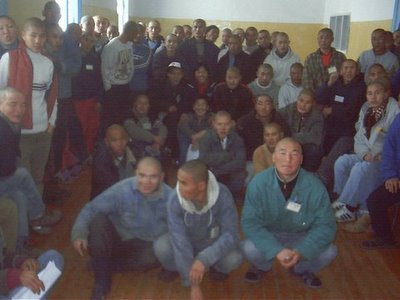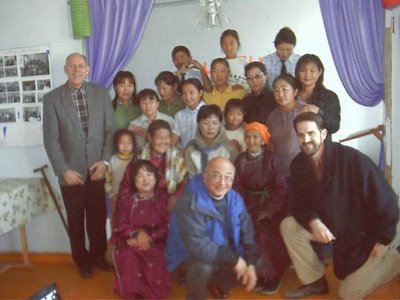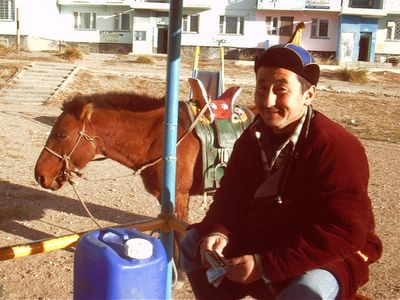It has been on my mind the past couple of days to insert a peice about the
beautiful Mongolian people that we encounter every day. So far we have
tended toward the tangibles... physical surroundings and events. Let's
face it, our language is so basic at this point that our interaction is mostly
limited to short phrases and facial expressions. Nevertheless, there is a
multitude of things to be discovered even with these limitations. I tend to
be a little more long-winded than Jer in my writing, but I will try to give a
brief painting:)
Children: There are many children!!!! They begin "Kindergarten" (our daycare/preschool)
at age two here, although not all attend. We live next to one of these Kindergartens.
We can hear the children crying when dropped off in the morning. Every little girl I see
has her hair neatly combed and usually in braids or pigtails--and it seems to stay
that way! I have to learn from them! The elementary girls all wear big, really big, white
bows in their hair. While the weather is still tolerable, the children reign in the courtyards.
Although most of the actual outdoor toys are ruined or gone, they always seem to have
something to play. I saw a group of girls making "soup" outside our window yesterday.
(For those of you who may not know, this is Maggie and Lydia's favorite pastime). I have
met several new mothers with babies Johanna's age. The babies are usually bundled in
almost a down blanket which is then tied with string from neck to toes to keep them tightly
. All that shows is wonderful chubby cheeks and a stocking cap clad head. The boys
all love to practice wrestling, and actual fighting is not uncommon either. Uniforms are worn
to school. The boys wear little pinstripe suits, and the girls, skirts and pinafores. There are
no buses here, so everyone walks or taxis to and from school. Usually they are in no hurry to
get home and I see them with backpack still on at 6 pm walking with friends. They love
to practice their English; and will follow you saying, "hello" over and over and laughing.
Sometimes they laugh hysterically as they repeat your own conversation they overheard in
English. Ondras, a girl I like to call Laura Ingalls because of her grin, is a very poor girl who lives
under a stairwell in an apartment building. I met her while living with our Mongolian family.
She is about 10 and was excited to play with Maggie and Lydia. She had us come and see her place to show me with an extremely sad face that water was leaking from above and had now gathered about two inches deep in her "home." She pointed to it several times. I felt so helpless. We have since met an American family living near her who I hope will help. She
ended the tour by reaching in a burlap sack and pulling out two happy-meal type toys, one for
each of the girls, and then re-padlocking her space. It was very interesting to me the way that
the culture has provided for her. In a place like Mongolia, an orphan left outside to brave the
weather would not survive. I do not think there are "homeless" people here in Darhan like their may be in a place like the Phillipines. Even though her living situation is not nice, to a small
degree, her needs have been met. I hope and pray that God by His grace is working in me to
look, listen and recognize the deepest need of these people, and preparing me, in a culturally
appropriate and Mongolian way to meet the need, alongside Mongolians themselves,when the time is right. I am sure it will be an "as you go" kind of service, and I look forward to it.


 Two churches rented a hall and shared a common service to celebrate Christmas. They are both from the outskirts of town where our smaller church in Darhan meets in a tent (Mongolian Ger). We were hoping to go to church in a Ger on Christmas, but a big party of Christmas Day service was pretty good.
Two churches rented a hall and shared a common service to celebrate Christmas. They are both from the outskirts of town where our smaller church in Darhan meets in a tent (Mongolian Ger). We were hoping to go to church in a Ger on Christmas, but a big party of Christmas Day service was pretty good. 


 Our language school threw a party for Christmas. Although the holiday is known here, and Christmas trees are part of the New Year Fesitivies, Christmas is not widely celebrated.
Our language school threw a party for Christmas. Although the holiday is known here, and Christmas trees are part of the New Year Fesitivies, Christmas is not widely celebrated. 
 We gathered Friday night after school for great food with our mission family. Instead of turkey, we ate chicken, a rare delacacy here. It was even more special because it was American chicken! Someone found it in a store in the capital a month or so ago.
We gathered Friday night after school for great food with our mission family. Instead of turkey, we ate chicken, a rare delacacy here. It was even more special because it was American chicken! Someone found it in a store in the capital a month or so ago. 
 I've talked to tougher ones. But having some experience in front of people is always nice when facing an intimidating audience. They were great listeners, even though they don't know the language I spoke in. One of the young guys from church, translated the little bit I said. They wanted to know how their place compared to American prisons, and what was different between the two countries. I got a resonating laugh when I mentioned some of vices that I was saved from.
I've talked to tougher ones. But having some experience in front of people is always nice when facing an intimidating audience. They were great listeners, even though they don't know the language I spoke in. One of the young guys from church, translated the little bit I said. They wanted to know how their place compared to American prisons, and what was different between the two countries. I got a resonating laugh when I mentioned some of vices that I was saved from. 
 This church is about a two hour drive (40 miles) from our town. The dirt road is quite raw; felt high seas in a small boat.
This church is about a two hour drive (40 miles) from our town. The dirt road is quite raw; felt high seas in a small boat.
 After a day out getting some needed excercise and shopping, we are getting some much needed fuel in this restaurant. It's nice to have extra hands to hold the girls.
After a day out getting some needed excercise and shopping, we are getting some much needed fuel in this restaurant. It's nice to have extra hands to hold the girls. 





